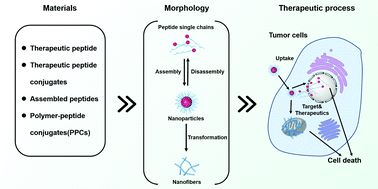Recent progress of therapeutic peptide based nanomaterials: from synthesis and self-assembly to cancer treatment
Abstract
Peptides have shown great potential in cancer treatment due to their good biocompatibility and low toxicity. However, the bioavailability and adverse immune response of peptides limit their further translation from bench to bedside. Over the past few decades, various peptide-based nanomaterials have been developed for drug delivery and cancer treatment. Compared with therapeutic peptides alone, self-assembled peptide nanomaterials have obvious advantages, such as improved stability and biodistribution for high-performance cancer therapy. In this review, we have described the synthesis, self-assembly and the anti-cancer application of therapeutic peptides and their conjugates, particularly polymer–peptide conjugates (PPCs).



 Please wait while we load your content...
Please wait while we load your content...